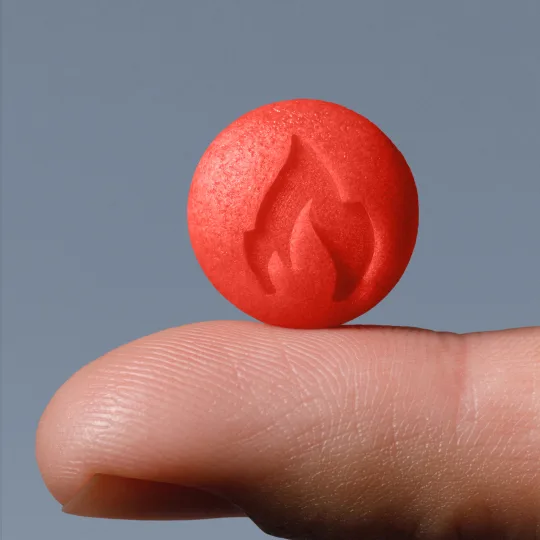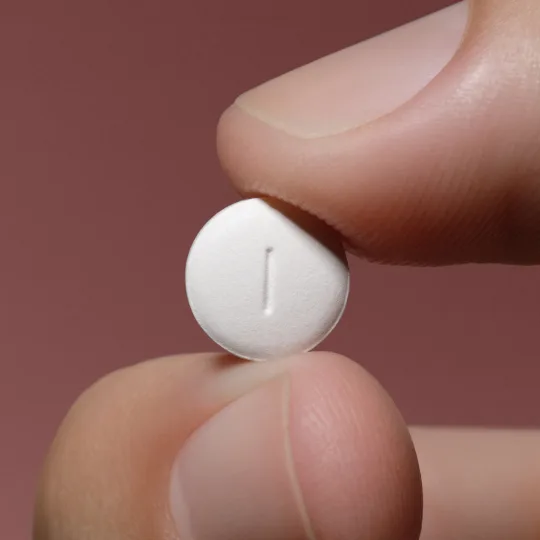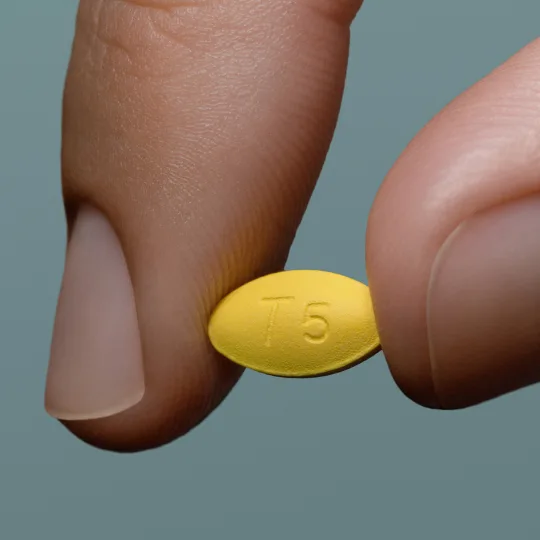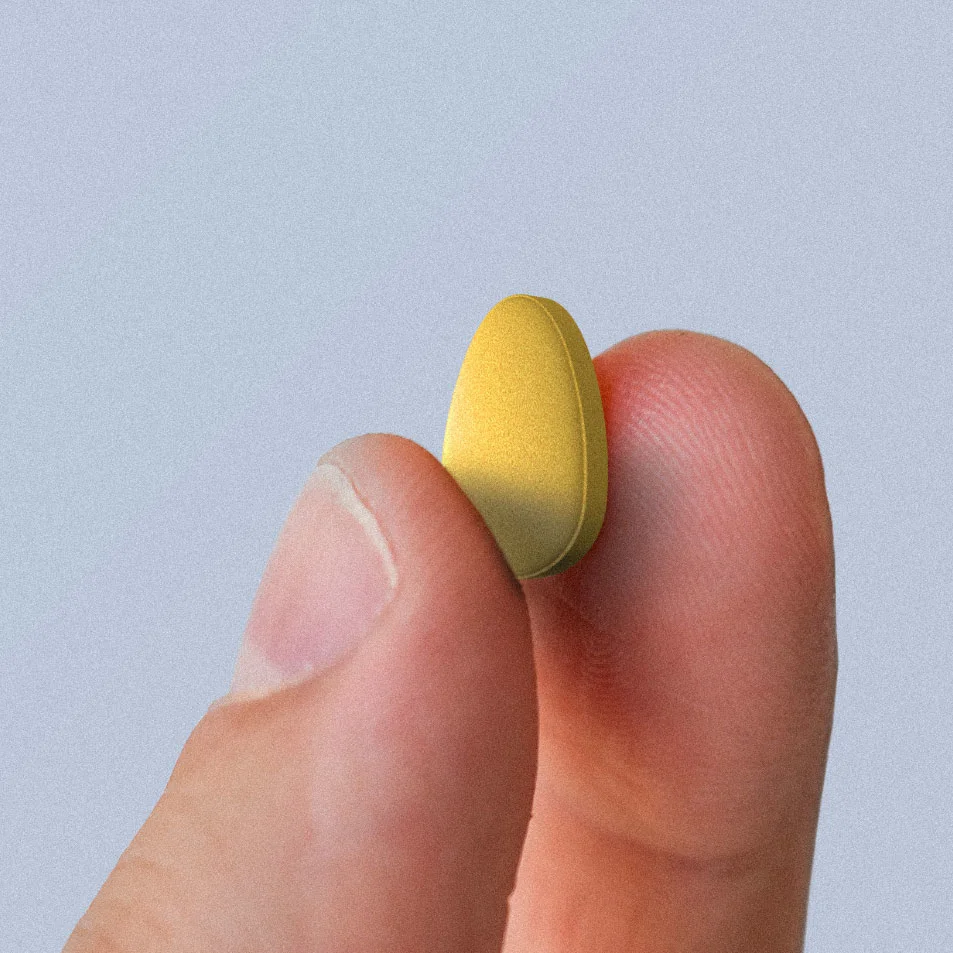Key takeaways
Viagra (sildenafil) can be taken daily but is usually prescribed on an as-needed basis, with at least 24 hours between doses.
The recommended starting dose for most people is 50 mg, but healthcare providers may adjust the dosage based on effectiveness and tolerance.
Taking more than the prescribed dose of Viagra can increase the risk of side effects, including low blood pressure and priapism (a prolonged erection requiring emergency treatment).
Viagra should not be taken with certain medications, including nitrates, and should be used with caution with some antifungal or HIV treatments, due to the risk of dangerous interactions.
For those looking for a more spontaneous or daily option, tadalafil (Cialis) or a combination ED treatment like Ro Sparks may be worth considering after consulting a healthcare provider.
Here's what we'll cover
Key takeaways
Viagra (sildenafil) can be taken daily but is usually prescribed on an as-needed basis, with at least 24 hours between doses.
The recommended starting dose for most people is 50 mg, but healthcare providers may adjust the dosage based on effectiveness and tolerance.
Taking more than the prescribed dose of Viagra can increase the risk of side effects, including low blood pressure and priapism (a prolonged erection requiring emergency treatment).
Viagra should not be taken with certain medications, including nitrates, and should be used with caution with some antifungal or HIV treatments, due to the risk of dangerous interactions.
For those looking for a more spontaneous or daily option, tadalafil (Cialis) or a combination ED treatment like Ro Sparks may be worth considering after consulting a healthcare provider.
When it comes to getting maximum satisfaction from your sex life, timing can be everything. That's particularly true when you're taking Viagra to treat erectile dysfunction (ED).
Viagra (sildenafil), the first and most popular oral prescription medication for ED, has a specific window of about six to eight hours during which it works. If you find that you need to take Viagra daily, it might be time to evaluate if the little blue pill is the right option for you.
Can I take Viagra every day?
Whether or not you take Viagra daily depends on your medical history, lifestyle, and other medications you may be taking. Consulting your healthcare provider is essential—they can evaluate your overall health, identify any potential risks or interactions, and determine if daily use of Viagra or its generic, sildenafil, is appropriate for you. And if it is, they’ll recommend the optimal dosage and frequency tailored to your needs.
Viagra works in part by supporting blood flow to the penis when you are aroused and preventing blood from leaving, which ultimately increases the amount of blood in your penis. This makes it easier to get and keep an erection after you are aroused.
Viagra doesn’t work on its own—you need to be sexually aroused for it to take effect. Sexual stimulation triggers blood flow to the penis, and Viagra can help keep that blood in place to sustain the erection.
These are some things to keep in mind when you’re taking Viagra:
For most people, Viagra begins working within 30 to 60 minutes.
Each dose of Viagra can work for about four hours. This may require you to do a little planning to sync your medication and your sex life.
If you miss your timing window or don't get the desired effect, you must wait 24 hours before taking another dose. This is true regardless of whether the medication helped you achieve an erection or not.
Most people start with a 50 mg dose of Viagra, but your healthcare provider will choose the best starting dose for you based on your overall health, medical history, and any medications you take.
The maximum daily dose is 100 mg, and you should never increase your dose without consulting your healthcare provider. Taking more may not improve your results. Instead, it could increase your risk of side effects and could lead to severe health complications.
The maximum dose may be prescribed to you if smaller doses of Viagra have not been effective and your body has tolerated the medication well, with few side effects.
After trying the medication, your provider might adjust the dose––for example, they may lower it to 25 mg if you experience side effects, or increase it if needed for better results.
The goal of ED medication is not to take the highest possible dose you can handle, but to find a dose that is both safe and effective for you. Research on the benefits of Viagra taken daily is still evolving, and healthcare providers typically prescribe it on an as-needed basis rather than for daily use.
Summary: how often can you take Viagra?
Question | Answer |
Can I take Viagra daily? | It’s possible to take Viagra daily if approved by your healthcare provider. |
What is the usual dosage? | Most people start with a 50 mg dose, but dosages can range from 25 mg to 100 mg depending on individual needs and your healthcare provider’s recommendations. |
How often can I take it? | Viagra should not be taken more than once every 24 hours. Using it more than once a day can increase the risk of side effects. |
What happens if it doesn’t work? | If a dose doesn’t work, you should wait at least 24 hours before taking another. Speak to your provider about adjusting the dosage if needed. |
Are there alternatives? | For those that need frequent treatment, daily tadalafil (Cialis) may be a better option. It’s approved for once-daily use at lower doses. |
Can you take 2 Viagra doses at once?
No, you should never take more than one dose of Viagra within a 24-hour period.
Taking double the dose recommended by your healthcare provider, even if the first dose doesn’t seem effective, can cause serious side effects, including dangerously low blood pressure and even priapism, which is an erection lasting four hours or longer that requires immediate medical attention.
Here’s what to do if you think your dose isn’t working:
Follow your healthcare provider’s instructions: Your healthcare provider will start you at a dose that suits your health and needs. If the prescribed dose doesn’t work, talk to your provider—they may adjust it safely. Never increase your dose on your own.
Time it right: Take Viagra about 30 minutes to 1 hour before you plan to have sex to give it time to work. Its effects can last up to four hours, providing a fairly flexible window for sex.
Don’t double up: If you’ve already taken one dose, wait at least 24 hours before considering another. Doubling your dose won’t improve results but could increase the risk of side effects.
Plan your meals: A heavy or high-fat meal (think burgers, fries, pizza) can delay how quickly Viagra works. For quicker results, try taking it on an empty stomach or after a lighter meal.
Taking it as prescribed: Take Viagra with water, swallowing the pill whole—don’t chew, crush, or attempt unconventional methods like snorting it. Proper ingestion helps ensure the medication works as intended.
If timing your meds is complicating your sex life, consider a fast-acting option like Ro Sparks.
Ro Sparks is a fast-acting ED treatment that combines the active ingredients of sildenafil and tadalafil into a single dissolvable tablet. It can take effect within 15 minutes and can last up to 36 hours. This eliminates the need for clock-watching and gives you more opportunities for spontaneous sex.
While this specific formulation is not FDA-approved as a combined product, its active ingredients are FDA-approved when taken separately as their own medications for treating erectile dysfunction
Remember that medications like Ro Sparks and Viagra don’t cause erections on their own—you need to be sexually aroused for them to work. If medications don’t seem effective after you use them as directed , then talk to your healthcare provider about potential adjustments.
Daily sildenafil benefits: what does the research say?
Medical research is full of unexpected twists, and Viagra’s origin story is no exception. Originally developed as a treatment for angina—a type of chest pain—researchers were surprised to discover something even more remarkable during clinical trials: the drug’s ability to help people achieve erections. What started as a heart medication quickly became one of the most famous breakthroughs in sexual health.
Viagra has been on the market for over two decades, and scientists continue to study its potential beyond ED, which has helped uncover some interesting possibilities.
Restoring nighttime erections
Most men have between three to five erections per night. This plays an important role in their sexual health by keeping the penis supplied with oxygen-rich blood while they sleep.
A small study conducted on sildenafil taken at bedtime compared with a placebo showed more than 3/4 of people taking 100 mg of Viagra at night experienced improved nighttime erectile activity compared to those who took a placebo. More research is required to see whether taking lower doses could have a similar effect, or if this has any utility in preventing erectile dysfunction down the road by improving nighttime penile blood flow.
Supporting men with diabetes
Type 2 diabetes can contribute to ED because of how it affects blood vessel health. In a 10-week study, men with diabetes who took 50 mg of sildenafil daily experienced significant improvements in both erectile function and penile blood flow.
These improvements were measured using an international erectile function scale and blood flow tests. Researchers concluded that daily use could help people with diabetes manage ED and contribute to penile health through improved blood flow.
Alzheimer’s disease prevention?
Perhaps one of the most surprising findings comes from a large study that tracked over 269,000 men with ED.
Researchers found that those who regularly took medications like sildenafil were significantly less likely to develop Alzheimer’s disease. Those who received more than 20 prescriptions had up to a 44% lower rate of developing the condition.
While it’s not entirely clear how sildenafil might help, experts believe that improved blood flow and reduced inflammation could play a role.
Protective daily use of sildenafil
Some experts believe daily sildenafil might even prevent ED. Dr. Irwin Goldstein, a leading urologist, has publicly advocated for daily low-dose sildenafil as a proactive approach to maintaining long-term erectile health.
Though this idea is still debated, it reflects a growing interest in using sildenafil beyond its current recommended usage.
What are the side effects of Viagra?
Viagra is typically safe and effective when taken as directed and with guidance from a healthcare professional. Common side effects include: headache, stuffy nose, and facial flushing. Some people who take this drug report reflux or indigestion. But in general, Viagra is usually well-tolerated.
It is important to tell your provider about any underlying conditions you have, including heart problems, such as heart failure or a history of heart attack, stomach ulcers, prostate issues, or any history of stroke, as well as any prescription drugs or other treatments you are taking.
In addition to side effects, it’s important to keep in mind that Viagra (sildenafil) can interact with other drugs. A few of these include:
Antifungal medications like ketoconazole or itraconazole
Nitroglycerin
The HIV medication ritonavir
Side effects vary for everyone, and this list is not exhaustive, which is why you should discuss all the medication you’re taking with your healthcare provider.
Sexual activity can put extra strain on your heart, especially if you have a history of heart conditions like high or low blood pressure or heart disease. Before taking Viagra, always make sure you are cleared for sexual activity by your healthcare provider.
While medications like Viagra or Cialis are generally safe for most people, your healthcare provider may want to monitor your blood pressure or adjust your dosage to keep things safe. If you’re concerned about how these medications might affect your heart health, it’s a good idea to talk with your provider before starting treatment.
What happens if you take too much Viagra?
Taking more than the recommended dose of Viagra can lead to serious health issues, even if you’ve taken the medication before without problems.
One of the most concerning risks is priapism, a prolonged erection lasting more than four hours. This is a medical emergency that can cause permanent damage to the penis if not treated as soon as it’s recognized.
In rare cases, Viagra can also cause vision problems, such as blurred vision and changes in color perception. Additionally, taking too much can lower your blood pressure dangerously, leading to dizziness, sudden hearing loss, or even fainting.
All this to say, the answer to how often you can take sildenafil depends on your specific medical situation, but it’s commonly prescribed for use once per day as needed.
How to determine if daily ED meds are right for you
When determining whether you should take daily ED medication, speak with your healthcare provider about which option is the safest and most effective choice for you. It's helpful to ask yourself the following questions:
How often do you have sex?
If you typically have sex once or twice a week and can usually predict when that might be, it makes sense to take Viagra as needed. But if you're having sex more often—say, multiple times a week or even every day—Viagra might be a less favorable option.
Instead, you can ask your healthcare provider about using Cialis (generic name tadalafil). This drug is available in doses that are approved for daily use. Also, while the active window of sildenafil is relatively short, tadalafil can work for up to 36 hours after you take it.
If your healthcare provider determines it's appropriate for you, Cialis can be a win-win. However, the choice between Cialis and Viagra depends on how you and your partner or partners plan to use the medication.
How much does spontaneity matter?
Because of Viagra's relatively short window of activity, it’s great for planned encounters but less ideal for spur-of-the-moment intimacy. If you value spontaneity, Cialis may be a better option, as it can work for up to a day and a half, allowing for more flexibility without needing to time your dose.
Have you experienced side effects from other ED meds?
If you’ve had side effects like headaches, facial flushing, or a stuffy nose while using Viagra, switching to a lower-dose, daily medication could reduce these issues since many effects are dose-dependent.
Some people tolerate Cialis better, while others may benefit from a different ED medication entirely. Be honest with your healthcare provider about your experience—they can adjust your treatment to help minimize side effects while improving effectiveness. It’s typical to work with your healthcare provider to change things like when you take the medication, what dosage you take, and even which medication you take before finding a routine that works for you.
Do you have any pre-existing conditions, or are you taking any other medications?
Not everyone can safely take ED medications like Cialis or Viagra. Here are some situations where you may need to consider alternatives:
You take nitrates for heart conditions.
You use medications like riociguat or Revatio for pulmonary arterial hypertension.
You’re on alpha-blockers like tamsulosin or prazosin for high blood pressure or an enlarged prostate (In some cases, you may need a lower dose of Viagra and in other cases you may be recommended against using Viagra).
You are already using another PDE-5 inhibitor. Avoid taking Viagra if you’re on vardenafil or Cialis (tadalafil) unless specifically instructed by your healthcare provider.
If you drink large amounts of alcohol (15 or more per week for men), daily Cialis may not be the best option. In some cases, it can interact with alcohol and cause a drop in blood pressure.
If you have more questions about ED medications or need medical advice, consult your healthcare provider.
If you have more questions about the medications used to treat erectile dysfunction or you need medical advice, speak with your healthcare provider.
Have better sex with Ro
Daily ED medications available through Ro
Ro offers several ED medications designed to be taken daily that can help maintain consistent erectile function.
Daily Rise Gummies contain 7 mg of tadalafil, the active ingredient in Cialis, in an easy, once-a-day gummy form that can help improve the ability to get and maintain erections without the need for precise timing. Discuss this option with your healthcare provider if you have any questions.
Cialis and tadalafil (generic Cialis) are also approved for daily use, allowing you to be ready for sex at any time. When taken at a lower dose, these medications can maintain a steady level of tadalafil in your system.
A healthcare provider can help you determine whether a daily ED medication is right for you.
Bottom line: daily use of Sildenafil
Viagra (sildenafil) is a well-known treatment for ED. It can help people achieve and maintain erections when they’re sexually aroused. But it’s important to use it correctly and safely to get the best results.
Viagra is usually taken as needed, with a maximum recommended dose of once per day. While some may consider daily Viagra, this isn’t the typical approach for most people. The medication works well for many and usually causes only mild side effects, such as headaches or dizziness.
Talk to your healthcare provider about how often you can take Viagra (sildenafil) or before adjusting your dosage. If you find yourself using sildenafil daily or even more than a few times a week, an option like Cialis (tadalafil) could provide more flexibility and reduce the need for advance planning.
The right treatment depends on what works best for you and your lifestyle. Reaching out to a healthcare provider can be the first step toward feeling more confident and in control of your sexual health.
DISCLAIMER
If you have any medical questions or concerns, please talk to your healthcare provider. The articles on Health Guide are underpinned by peer-reviewed research and information drawn from medical societies and governmental agencies. However, they are not a substitute for professional medical advice, diagnosis, or treatment.
Viagra Important Safety Information: Read more about serious warnings and safety info.
Cialis Important Safety Information: Read more about serious warnings and safety info.
References
DailyMed. (2020). Viagra-sildenafil citrate tablet, film-coated. Retrieved from https://dailymed.nlm.nih.gov/dailymed/lookup.cfm?setid=a2a9f459-e692-4e85-83b0-a35fbf35e91b
Deyoung, L., Chung, E., Kovac, J. R., et al. (2012). Daily use of sildenafil improves endothelial function in men with type 2 diabetes. Journal of Andrology, 33(2), 176–180. doi: 10.2164/jandrol.111.013367. Retrieved from https://pubmed.ncbi.nlm.nih.gov/21680809/
Dhaliwal, A. & Gupta, M. (2023). PDE5 inhibitors. StatPearls. Retrieved from https://www.ncbi.nlm.nih.gov/books/NBK549843/
Eli Lilly & Company. (2023). Cialis (tadalafil) tablets, for oral use: Highlights of prescribing information. Retrieved from https://pi.lilly.com/us/cialis-pi.pdf
Goldstein, I., Burnett, A. L., Rosen, R. C., et al. (2019). The Serendipitous Story of Sildenafil: An Unexpected Oral Therapy for Erectile Dysfunction. Sexual Medicine Reviews, 7(1), 115–128. doi: 10.1016/j.sxmr.2018.06.005. Retrieved from https://www.sciencedirect.com/science/article/abs/pii/S2050052118300830?via%3Dihub
Lim, P. H., Moorthy, P., & Benton, K. G. (2002). The clinical safety of Viagra. Annals of the New York Academy of Sciences, 962, 378–388. doi: 10.1111/j.1749-6632.2002.tb04082.x. Retrieved from https://pubmed.ncbi.nlm.nih.gov/12076989/
Montorsi, F., Maga, T., Strambi, L. F., et al. Sildenafil taken at bedtime significantly increases nocturnal erections: results of a placebo-controlled study. Urology, 56(6), 906-11. doi: 10.1016/s0090-4295(00)00841-4. Retrieved from https://www.sciencedirect.com/science/article/abs/pii/S0090429500008414
Moynihan, R. (2003). Urologist recommends daily Viagra to prevent impotence. BMJ: British Medical Journal, 326(7379), 9. Retrieved from https://pmc.ncbi.nlm.nih.gov/articles/PMC1124975/
Peng, J., Zhang, Z., Gao, B., et al. (2016). Effect of daily sildenafil on patients with absent nocturnal erections due to pelvic fracture urethral disruption: a single-centre experience. Andrologia, 48(10), 1120–1124. doi: 10.1111/and.12548. Retrieved from https://pubmed.ncbi.nlm.nih.gov/26857429/
Schiavi, R. C. & Schreiner-Engel, P. (1988). Nocturnal penile tumescence in healthy aging men. Journal of Gerontology, 43(5), M146–M150. doi: 10.1093/geronj/43.5.m146. Retrieved from https://pubmed.ncbi.nlm.nih.gov/3418036/
U.S. Food and Drug Administration. (2017). Highlights of prescribing information: Viagra (sildenafil citrate) tablets, for oral use. Retrieved from https://www.accessdata.fda.gov/drugsatfda_docs/label/2017/020895s048lbl.pdf


















